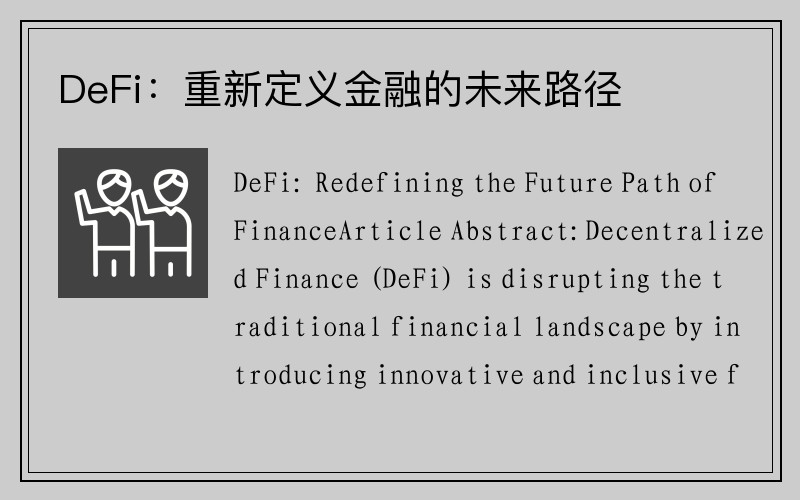精品项目
DeFi:重新定义金融的未来路径
DeFi:重新定义金融的未来路径
DeFi: Redefining the Future Path of Finance
Article Abstract:
Decentralized Finance (DeFi) is disrupting the traditional financial landscape by introducing innovative and inclusive financial services to individuals across the globe. This article delves into the revolutionary impact of DeFi on the future of finance, encompassing its key aspects, benefits, challenges, and potential for reshaping the financial industry.
1. The Revolutionary Impact of DeFi
DeFi is revolutionizing finance by leveraging blockchain technology to create a decentralized, permissionless, and transparent financial system. This new paradigm enables individuals to access a wide range of financial services without the need for intermediaries, such as banks or financial institutions. By eliminating barriers to entry and promoting financial inclusion, DeFi empowers users to participate in lending, borrowing, trading, and asset management in a trustless and secure environment.
The democratization of financial services through DeFi has the potential to reduce global economic inequality and provide individuals in underserved regions with access to essential financial tools. Moreover, the programmable nature of DeFi protocols allows for the development of innovative financial instruments, such as decentralized autonomous organizations (DAOs) and synthetic assets, which can further expand the scope and versatility of financial services available to users.
The growing adoption of DeFi demonstrates its capacity to challenge traditional financial intermediaries and reshape the future of finance. However, this disruptive potential also raises concerns regarding regulatory compliance, security vulnerabilities, and the need for sustainable governance models within the DeFi ecosystem.
2. Benefits of DeFi for Financial Inclusion
DeFi's emphasis on inclusivity and accessibility has the potential to revolutionize the way individuals interact with financial services. By leveraging blockchain technology and smart contracts, DeFi platforms enable peer-to-peer transactions, lending, and borrowing without the need for traditional intermediaries, thereby reducing costs and increasing efficiency. This approach has the potential to provide financial services to the unbanked and underbanked populations, fostering greater economic participation and empowerment.
Furthermore, the composability of DeFi protocols allows for the seamless integration of various financial services, creating a vibrant and interconnected ecosystem that facilitates innovation and collaboration among developers. The open and permissionless nature of DeFi also promotes a more equitable distribution of financial resources, enabling individuals to participate in global markets and asset management on their own terms.
Despite its potential benefits, DeFi faces challenges related to scalability, user experience, and security, which must be addressed to ensure widespread adoption and long-term sustainability.
Binance交易所3. Challenges and Opportunities in DeFi
The rapid growth of the DeFi ecosystem has brought to light a myriad of challenges and opportunities that shape its future trajectory. Scalability issues, high gas fees, and interoperability between different DeFi protocols present significant technical hurdles that need to be overcome to ensure a seamless and efficient user experience.
Moreover, the regulatory landscape surrounding DeFi remains uncertain, with concerns about compliance, consumer protection, and potential risks associated with unregulated financial activities. Collaboration between industry stakeholders, policymakers, and regulatory bodies is essential to establish a coherent regulatory framework that balances innovation with consumer protection and financial stability.
Amid these challenges, the opportunities presented by DeFi are vast, as it continues to push the boundaries of traditional finance and create new avenues for financial innovation. DeFi's potential to revolutionize asset tokenization, decentralized governance, and global financial inclusion highlights the transformative impact it can have on the future of finance.
4. Reshaping the Financial Industry with DeFi
The disruptive potential of DeFi is reshaping the financial industry by challenging traditional intermediaries, promoting financial inclusion, and fostering innovation. As DeFi continues to gain traction, its transformative impact on finance extends beyond financial services to encompass the broader economic landscape, with implications for monetary policy, regulatory frameworks, and global financial infrastructure.
In conclusion, DeFi's ability to redefine the future path of finance hinges on its capacity to address challenges related to scalability, security, and regulatory compliance, while leveraging its inherent strengths in promoting financial inclusion, innovation, and decentralization. As the DeFi ecosystem evolves, the collaboration of industry stakeholders, regulatory bodies, and innovators will be pivotal in realizing its potential to revolutionize the future of finance.
In summary, DeFi is revolutionizing the future of finance through its decentralized, inclusive, and innovative financial services, presenting both opportunities and challenges that will shape the trajectory of the financial industry. It has the potential to democratize access to financial services, foster global economic empowerment, and transform traditional financial paradigms, paving the way for a more inclusive and dynamic financial future.

